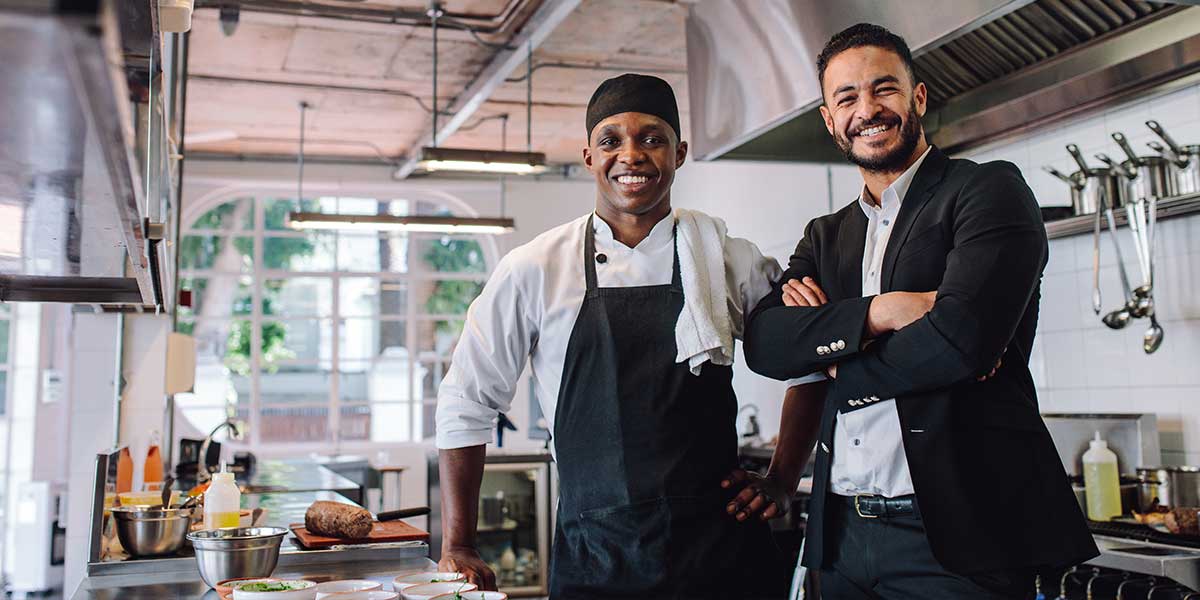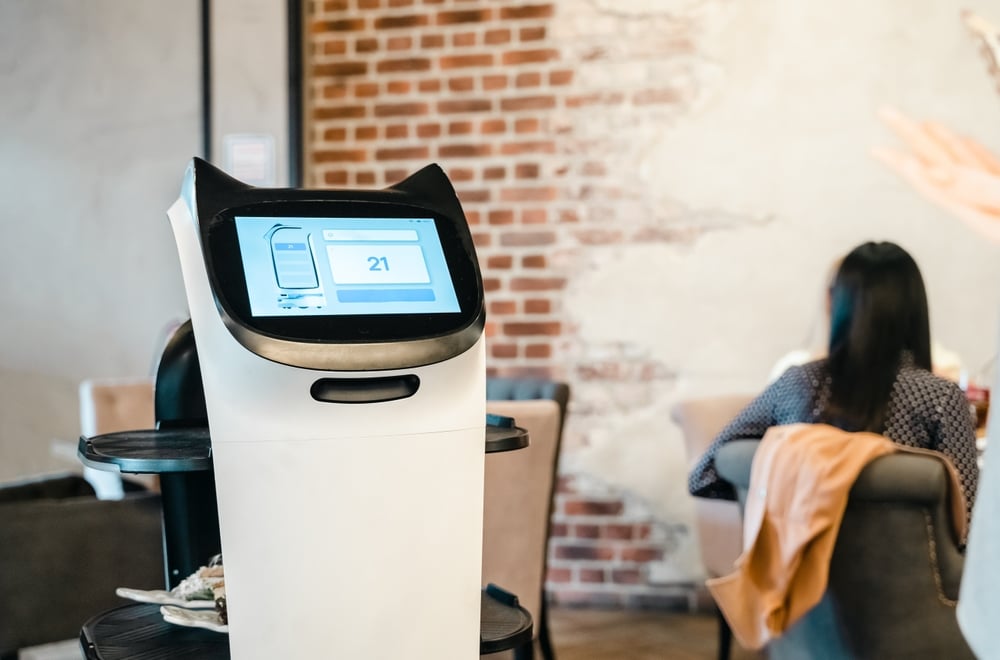The restaurant business is a lucrative and rewarding industry despite being prone to several challenges. Some of these challenges involve strong competition, high commercial rentals, labour and food costs, and ongoing changes to market trends. However, with proper planning and strategic implementation, you can overcome the challenges and run a successful restaurant business.
Hospitality management can include the combination of overseeing daily tasks and building on key strategies, allowing the business to stay on course for long-term growth and success.
Moreover, having your own restaurant requires you to be more involved and have an in-depth understanding of the business and its performance. The below breakdown of essential strategies and business practices to implement can help achieve restaurant management success.
What is Restaurant Management?
Restaurant management involves balancing various targets, expectations and processes to ensure the restaurant is operating efficiently on a regular basis. Restaurant operations such as food production, labour and food costs, inventory tracking, customer service, staff training, and maintaining marketing channels are all essential daily tasks.
Additionally, managing the workforce, finances, planning company strategies, and public relations also need to be reviewed regularly if not done so on a daily basis.
Why is Restaurant Management Important?
Restaurant management is the foundation for achieving and maintaining success in the highly competitive food service industry. Ensuring seamless operations across all restaurant processes and customer services remains the utmost priority in achieving business success.
Moreover, effective restaurant management can help maintain good relationships with vendors, implement efficient systems, maintain high-quality food and services, build staff morale and job satisfaction, and increase profits.
8 Restaurant Management Tips
Restaurant management is a complex yet crucial component in achieving success. The best restaurant managers are able to practice and advocate the essential skills below. Incorporating these essential restaurant management tips will ensure the long-term success of your business while seamlessly making sure all areas of the restaurant are operating effectively.
1. Set Clear Goals & Objectives
Before diving into the daily operational tasks, you have to know and be able to articulate clearly what your goals and objectives are for the restaurant. This promotes new outlooks and problem-solving skills to tactical issues efficiently and helps keep your focus on reaching the restaurant's objectives.
These goals need to be specific, achievable, measurable, and flexible if changes are required, this ensures the business is clearly aware of its objectives and the progresses it has made at every stage.
2. Develop a Strong Business Plan
A business plan can guide a restaurant owner through the stages of starting a business to managing it and strategically navigating through the competitive industry by identifying and utilising their unique selling proposition.
Five key benefits of writing a business plan include:
-
Raise money from potential investors
-
Clearly define and focus on your business strategies
-
Make appropriate decisions that align with your business objectives
-
Identify issues and potential weaknesses as early as possible
-
Communicate your business strategies and reasonings with stakeholders
There is no right or wrong way to construct a business plan as long as it is able to meet your short-term and long-term business needs.
3. Implement Effective Inventory and Cost Management Systems
Regularly evaluating your business can help with staying on track to achieve your business goals and identify issues to resolve early on. An integral part of this success is an effective inventory and cost management system.
An inventory management system is a fundamental part of supply chain management that focuses on ensuring the restaurant always has the right products and quantity at the right time to serve customers. A proficient inventory management system should:
-
Improve cash flow
-
Forecast demand and adjust orders accordingly
-
Real-time inventory tracking
-
Optimise organisation of stock
-
Produce easy inventory analysis reports
The cost management system is the foundation of strategic implementations and provides adequate resources to ensure the highest level of quality and productivity with the lowest overall costs.
Cost management doesn't necessarily mean cutting costs. Rather, it is the process of analysing current uses of resources and finding opportunities to optimise performances further, often leading to reduced food costs and labour costs.
Overall, effective inventory management and cost management systems help optimise resources and performance and maximise a restaurant's profits by making informed business decisions.
4. Provide Excellent Customer Service
Managing customer experience can be difficult at times. However, it is essential for a restaurant's success as it directly impacts the profitability of the business. You can provide the best quality food and the best environment. However, a restaurant will continue to lose to its competition if they don't have the customer service component right. Here are some reasons why it's important to excel in customer service:
Increase in customer loyalty
Offering a consistent and positive customer experience will build a positive relationship with customers and increase their loyalty toward the restaurant and its brand. Strong customer loyalty can translate to positive word of mouth, a simple yet powerful marketing strategy that automatically builds trust, credibility and loyalty.
Returning customers with repeat business
Excelling in customer service and leaving guests with a lasting and positive experience can increase the frequency of repeat customers. Guests will happily return to experience the same quality of food and service if they deem it to be a more pleasant experience compared to other restaurants.
Increase in sales
As you build a strong and positive brand around providing exceptional customer services, both new and existing customers will continue to frequent the restaurant. Leading to an increase in sales and profitability of the restaurant.
Now that you know why it's vital for a restaurant to perform and provide services that meet customer expectations. Here are some tips on what you can implement now to improve customer service:
-
Hire and train great staff
-
Greet and serve customers with appropriate etiquette
-
Offer seasonal experiences and menus
-
Incentivise loyalty
-
Encourage customer feedback and understand how to improve further
-
Go above and beyond customer's expectations
-
Resolve customer issues immediately
Providing great services can dramatically improve a customer's experience and can leave a lasting positive impression.
Many restaurant managers fail to prioritise delivering exceptional customer service. Or even when they do, it is not consistent, as the quality of service tends to decline after the initial opening of the restaurant. Which further damages the future sales and profitability of a restaurant.
5. Motivate & Manage Employees Well
The ongoing struggle and decline in staff retention have proven costly, inefficient, and time-consuming for restaurant owners. Poor management of staff and demotivated employees will translate over to poor customer service, leaving patrons with a negative experience.
On the other hand, without your team, the restaurant will not be able to operate. So how do you keep restaurant staff motivated and customers happy? Here are a few suggestions:
-
Communicate the restaurant's goals and objectives
-
Incentivise staff if they are able to upsell and increase sales
-
Hold regular staff meetings to build rapport and raise morale
-
Ensure all staff are paid regularly
-
Improve on company culture, offer team building activities
-
Conduct regular employee satisfaction and engagement surveys to identify weaknesses and areas to improve on
-
Recognition and reward staff for their efforts and contribution
-
Provide training for entry-level positions and managerial positions
Moreover, allowing employees to be on the same page and work toward a common goal can improve company culture and raise staff rapport which will translate to better customer service. Restaurant owners and managers should provide regular training programs, especially when there are new changes in the restaurant regarding new menus and service strategies.
Staff retention is a growing concern across the hospitality industry. This is why it is more important to start implementing the above suggestions for creating a positive company culture that manages staff well and helps motivate them.
6. Utilise Technology to Streamline Operations
Technology has been key to enhancing how we operate, communicate, and conduct business. It offers automation and scalability that allows a business to function efficiently while gaining back time previously spent on repetitive and time-consuming tasks.
Daily restaurant operations could benefit immensely from appropriate technology to streamline tasks, such as simple-to-use scheduling software. Enabling restaurant managers to focus and prioritise responsibilities that directly impact profitability, such as customer satisfaction, employee management, and cost management.
ResDiary is built for hospitality professionals seeking to automate their booking and management systems. With tools to help your restaurant increase its bookings and revenue, manage reservations and reduce no-shows. Book a ResDiary demo to find out if it is the right fit for your hospitality business. Whether it's a restaurant, bar, cafe, bistro, hotel, pub, or club, this software will help streamline your operations.
7. Stay Up-to-Date on Industry Trends & Adapt to Changes
The hospitality restaurant industry is constantly evolving and increasingly competitive. Staying informed with industry trends and having the flexibility to adapt to changes will help your hospitality business thrive in challenging and unexpected times.
Many restaurants struggle with maintaining a level of relevancy in the latest hospitality trends, often leaving them behind. In order to avoid becoming like other restaurants that are unable to adapt, here are some suggestions:
-
Subscribe to hospitality industry-related news via online platforms
-
Stay connected with customers through social media accounts, post about trends and how the restaurant incorporates them
-
Planning ahead with flexibility for sudden changes
-
Regular meetings to review the latest trends for how or if the restaurant should adopt any
-
Maintain marketing efforts with new promotions and restaurant updates
-
Review the restaurant's budget and financials to see if these changes are viable from a monetary perspective
To manage a restaurant successfully, you need to stay consistent in performance and maintain relevancy by adapting to current industry trends. Knowing when to pivot can help a restaurant work strategically to maintain relevancy and profitability. Additionally, staying informed with industry trends also enhances a customer's experience by meeting their new expectations based on the latest trends.
8. Promote Your Establishment
Promoting your hospitality establishment in the local community is vital in building a reputable brand that can attract higher customer loyalty rates and repeat patrons.
The restaurant industry is flooded with local competition. That's why you need to use every opportunity to maximise your exposure and build a reputable brand. Whether it's large or small restaurants, it is beneficial to use this opportunity to create an effective marketing strategy to promote your establishment. Below are a few specific suggestions to get started with:
Promote your restaurant and its USP
As you begin to promote your brand, be sure to inform the audience of your unique selling points (USP) that can help emphasise why they should visit your restaurant over others. USP can be providing great food, a better restaurant experience, seasonal menu items, or a great restaurant atmosphere.
Provide a better customer experience online and in person
With such a connected society through online channels, you can reach your desired audiences through social media ads and platforms. Combining a better customer experience both online and offline can leave an all-rounded and lasting memory for your customers. Giving the impression that your restaurant truly values their business by staying connected with them and keeping them updated with restaurant news and promotions.
Offer frequency and loyalty rewards programs
Providing an incentive program that prompts the frequency and loyalty of guests can help drive more visits and sales to your restaurant. Whether it be earning points for cashback or a free product, these incentive programs can boost engagement from customers and can further promote your brand.
Common Challenges Involved With Restaurant Management
Besides the ongoing changes in consumer behaviour and market trends, restaurant owners need to manage others areas of the restaurant. Below are some common challenges that restaurant managers face on a regular basis.
Managing Costs
For a restaurant to continue being profitable, restaurant owners must constantly monitor costs, review budgets, forecast expenses, and maintain consistent cash flows. This directly relates to food, labour, and overhead costs, which are also constantly fluctuating in price.
It is the responsibility of the owner and general manager to understand where the costs are going, which can provide insight into good business decisions and find opportunities to maximise profit margins and performance. This can be achieved by reducing food waste, renewing negotiations with suppliers monthly or quarterly, first in first out procedures, and analysing sales data. Another way to manage costs is to cut costs where appropriate, only if it does not jeopardise the quality of customer experiences.
Maintaining Food Quality
Ensuring consistent, high-quality food at the appropriate prices can be an ongoing challenge, especially in high-volume restaurants. This is where restaurants often neglect the food quality and prioritise other factors such as supplier pricing, decor and atmosphere, and creating the best menu. A restaurant can tick all the boxes of a perfect establishment. However, if the food quality is poor and the ingredients aren't fresh, you still lose out on customers.
Food quality is precisely what determines a customer's choice to be a repeat patron. It is vital that the freshest ingredients are sourced in order for your head chef and line cooks to be able to produce the food and beverages that the customers will enjoy and become regular customers.
Customer Satisfaction
Whether you're currently running an establishment or about to start a new restaurant, maintaining customer satisfaction is an ongoing challenge, especially during busy times. Providing excellent customer service and ensuring that guests have a positive experience is a catalyst for building positive word of mouth, a free restaurant marketing tactic that is often overlooked by most restaurants.
Factors such as staff etiquette towards customers, listening to feedback, consistency, the atmosphere, menu items, and food and beverage qualities all contribute to customer satisfaction. And the last thing you want to do during busy periods is to take reservations, cancellations or even stress about sitting arrangements. Hence, automated scheduling software such as ResDiary could remove the time and labour spent on reservations so you can focus on providing the best possible customer experiences.
Employee Management
Employee management is an integral aspect of running a successful and profitable restaurant. Motivated and loyal staff can significantly affect customer satisfaction, employee retention, company culture and overall business success.
To implement successful employee management is to hire, train, and retain good employees that share the same positive attitude and values that represent the restaurant. Followed by consistently maintaining clear communication, promoting work-life balance, providing recognition and rewards, and offering ongoing training and development. This significantly increases the team's morale, job satisfaction and retention rate.
Dealing With Unexpected Events
Even if you follow standard operating procedures, there are still unavoidable moments and events that occur out of your control. Unexpected events such as weather, equipment failures, or employee call-outs can throw a wrench in operations and will require quick problem-solving.
Although such events are out of your control, there are ways to mitigate the severity of damages caused by unforeseen circumstances. Such as creating a contingency plan, regular maintenance of equipment, adequate staff training, and continuity of service when appropriate. By actively responding to these unexpected challenges and being able to minimise the impacts, your restaurant can continue to operate steadily and maintain customer satisfaction.
Managing a Large Menu
Offering a large and well-designed menu can increase sales and create a memorable dining experience. However, it can cause more problems if not managed accurately. A large menu offers more variety, which means additional ingredients and inventory control is required. Having a good system in place can help the restaurant operate more efficiently while maintaining customer satisfaction. Some quick suggestions include:
-
Analysing menu data to identify popular and unpopular dishes
-
Seasonal and regular menu updates to offer the freshest ingredients and keep customers interested
-
Opt for menu items with overlapping ingredients to reduce waste
-
Encourage customer feedback
Although it can be time-consuming and challenging to manage a large menu, there are strategic ways, such as the above, to overcome the challenges and maximise the profits and performance of a restaurant.
Dealing With Competition
The hospitality industry has new and existing competitors on a regular basis. Establishing a strong brand with high-quality products and services can help your restaurant stand out in a crowded market. It is essential to know your competitors, receive customer feedback, and continuously innovate with up-to-date trends in order to differentiate your restaurant.
As you differentiate from competitors, you are able to focus on quality and building stronger relationships with your customer base. An opportunity for increasing regular customers and progressing with upward sales trends.
What is the Role of a Restaurant Manager?
The role of a restaurant manager is multifaceted, as a restaurant cannot operate successfully without an experienced and effective restaurant manager. They work tirelessly both behind the scenes and front of house, ensuring all staff in different areas are working efficiently while upholding high-quality customer service.
Restaurant managers must be able to balance multiple responsibilities, including leadership duties, managing budgets and inventory costs, hiring and scheduling staff, maintaining customer satisfaction, and resolving employee and restaurant issues.
How to Reduce Food Costs in Restaurant Management
Among the many factors to consider while managing a restaurant, managing food costs are a key component in helping a business maintain profitability and productivity. Food wastage, poor inventory control, and poor negotiations and relationships with suppliers are all major factors that contribute to an unnecessary increase in food costs. Here are a few simple steps to help reduce food costs:
-
Frequent inventory checks
-
Negotiate and compare prices from multiple vendors
-
Build rapport and a better relationship with existing vendors
-
Implement first in first out (FIFO) system for all inventory
-
Source seasonal ingredients
Educating yourself and your staff on how to reduce food costs will significantly improve your profit margins and cash flow. While also being able to efficiently use all purchased goods instead of increasing your restaurant's wastage levels.
Frequently Asked Questions (FAQ’s)
Is Managing a Restaurant Easy?
Managing a restaurant is not an easy responsibility to take on and should be carefully considered before you venture into the industry. Being a successful restaurant owner and manager requires various skills, such as leadership, financial knowledge, customer service, food and beverage knowledge, and even marketing.
If you're a person that thrives in a constantly busy and bustling environment, loves a challenge and can handle unexpected changes, then this may be a suitable path for you.
What Jobs Can You Get With Restaurant Management Experience?
Restaurant management experiences can open you up to many opportunities when the time comes for a career change. The multifaceted role exposes an individual to all aspects of running a restaurant, that includes sales, marketing, financial and leadership skills.
Many restaurant managers can easily switch careers and even industries due to the immensely transferrable and desirable skillsets they have developed during their restaurant management years. Here are a few of the many career opportunities after being a restaurant manager:
-
Event planner/manager
-
Sales representative
-
Team leader
-
Human resources manager
-
Operations manager
-
Purchasing manager
-
Project manager
There are endless opportunities that being an experienced restaurant manager can provide once you have developed transferrable skills within the role.
ResDiary can help you run a successful restaurant with technology designed to help you deliver compelling customer experiences. Find out how it all works:




